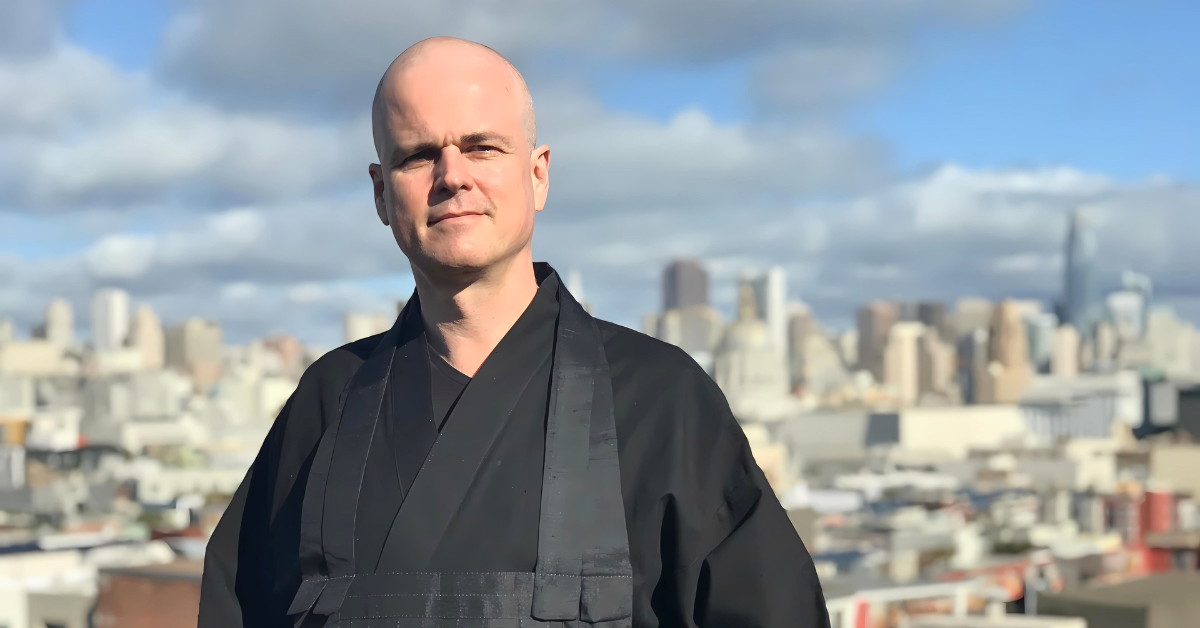
By Tova Green
When Sozan Miglioli came to City Center in 2013 for the first time, he attended a Saturday Dharma talk given by Paul Haller. Sozan was on his honeymoon with Paula Pietranera. He had read Zen Mind Beginners’ Mind and was curious about Suzuki Roshi’s teachings. Sozan had already been practicing Zen in the Deshimaru lineage for about ten years and had done retreats in Europe.
Sozan’s visit to City Center marked a big turning point in his Zen practice. He was touched by “Suzuki Roshi’s flavor of practice—the warmth, the closeness.” After returning to his home in Buenos Aires, where he had founded an advertising company in 1998, he found ways to come back to San Francisco Zen Center for a day or two when he was traveling for work. In Argentina he couldn’t find this expression of practice.
Sozan returned to City Center for his first practice period in 2014. He thought, “This practice should be available in Spanish and it isn’t.” He decided “to leave my company and come to San Francisco Zen Center to study, train, ordain and become a teacher, so I could express Suzuki Roshi’s teachings in Spanish. I didn’t know how that might manifest.”
After going to Tassajara for three practice periods, Sozan returned to City Center. He began guiding “Zen en Español,” a practice group that had begun earlier and needed a new leader, in 2017. The usual attendance was seven or eight people. Soon after the beginning of the Covid-19 pandemic they started meeting on Zoom.

Sozan with his students and his teacher, Rinso Ed Sattizahn.
“People began attending from different places in the U.S., Europe, Central and South America. That’s when Zen sin Fronteras (Zen Without Borders) was born, to make Suzuki Roshi’s practice available to Spanish speaking communities around the world. It started growing organically and I decided not to stop it.” Sozan now has a podcast with 40,000 downloads, and 250,000 followers on Facebook and Instagram where he also shares his teachings.
For the last three years Sozan has been giving a Dharma talk every Saturday to his online sangha, as well as offering online zazen during the week. Last year he did in-person retreats in Argentina and Spain, and will offer a Hispanic “Sangha Week” in Tassajara in September. He encourages his students to come to City Center to practice. Several of his students from Colombia, Argentina, Uruguay and elsewhere have received Jukai (lay initiation) at City Center.
While offering so many Dharma opportunities, Sozan has held demanding leadership roles at San Francisco Zen Center—Vice President and President—for the last six and a half years. He has had very little time to give to Zen Without Borders as it has continued to grow.
Sozan stepped down at the end of June after three years as President in order to devote all of his time to Zen Without Borders. He says, “I was trained in business and advertising, have been studying Zen for twenty years, and I live in the epicenter of technology, Silicon Valley. This all comes together in a special way to support me in expanding Zen Without Borders which is now a non-profit corporation.”
San Francisco Zen Center recently established a Teacher Fellowship program—a Diversity, Inclusivity and Belonging initiative for teachers reaching underserved communities. Sozan will be the first teacher to benefit from the Fellowship. It offers Sozan and Paula housing at San Francisco Zen Center for the next two years.
This will enable Sozan to have the ongoing support of his teacher, Rinso Ed Sattizahn, and his peers and friends at San Francisco Zen Center. Sozan was ordained by Ed Sattizahn in 2018 and was Shuso (Head Student) in 2020. His Dharma name is Seigan Sozan, Sincere Vow, Ancestor Mountain.











